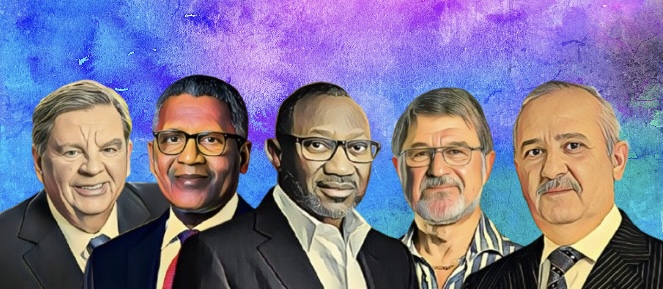Key Points
-
Aliko Dangote is the richest person in Africa, with $23.9 billion.
-
Africa’s billionaires now have a combined wealth of $105 billion.
-
South Africa has the most billionaires, followed by Nigeria and Egypt.
Forbes has revealed its 2025 list of Africa’s wealthiest individuals, and Aliko Dangote, the owner of Dangote Petroleum Refinery, is at the top.
He is worth $23.9 billion, which is a big jump from $13.9 billion last year. This increase is due to the rising value of his refinery, which is now included in his total wealth for the first time.
Mike Adenuga, the chairman of Globacom, follows Dangote, with a net worth of $6.8 billion, ranking fifth.
Abdulsamad Rabiu, who runs BUA Group, is also high on the list, with a net worth of $5.1 billion, placing him sixth.
Top richest people in Africa for 2025
Here are the top billionaires in Africa, according to Forbes:
-
Aliko Dangote (Nigeria) – $23.9 billion (Dangote Petroleum Refinery)
-
Johann Rupert (South Africa) – $11.1 billion (Luxury goods, Richemont)
-
Nicky Oppenheimer (South Africa) – $9.4 billion (Diamonds, De Beers)
-
Mike Adenuga (Nigeria) – $6.8 billion (Telecoms, Globacom)
-
Nassef Sawiris (Egypt) – $6.7 billion (Construction, Orascom)
-
Abdulsamad Rabiu (Nigeria) – $5.1 billion (Cement & Sugar, BUA Group)
-
Issad Rebrab (Algeria) – $4.6 billion (Food industry, Cevital)
-
Nathan Kirsh (Eswatini/South Africa) – $4.1 billion (Retail, Jetro Holdings)
-
Patrice Motsepe (South Africa) – $3.9 billion (Mining, African Rainbow Minerals)
-
Koos Bekker (South Africa) – $2.8 billion (Media, Naspers)
-
Mohamed Mansour (Egypt) – $2.6 billion (Diversified business, Mansour Group)
-
Strive Masiyiwa (Zimbabwe) – $2.5 billion (Telecoms, Econet)
-
Youssef Mansour (Egypt) – $1.9 billion (Retail, Mansour Group)
-
Mohammed Dewji (Tanzania) – $1.8 billion (Manufacturing, MeTL Group)
-
Aziz Akhannouch (Morocco) – $1.7 billion (Petroleum, Afriquia Gaz)
-
Yasseen Mansour (Egypt) – $1.7 billion (Consumer goods, Mansour Group)
-
Othman Benjelloun (Morocco) – $1.6 billion (Banking & Insurance, BMCE Bank)
-
Femi Otedola (Nigeria) – $1.5 billion (Banking, FBN Holdings)
-
Michiel Le Roux (South Africa) – $1.4 billion (Banking, Capitec Bank)
-
Christoffel Wiese (South Africa) – $1.3 billion (Retail, Pepkor & Shoprite)
Key takeaways from Forbes’ 2025 Billionaires List
South Africa leads the way with seven billionaires, followed by Nigeria and Egypt with four each. Other countries represented include Morocco (3), Algeria (1), Tanzania (1), and Zimbabwe (1).
The combined wealth of Africa’s billionaires is $105 billion, up from $82.4 billion in 2024. This increase is largely due to higher market values and economic growth in many African countries.
Forbes tracks the wealth of African billionaires who live in Africa or have their main businesses there.



